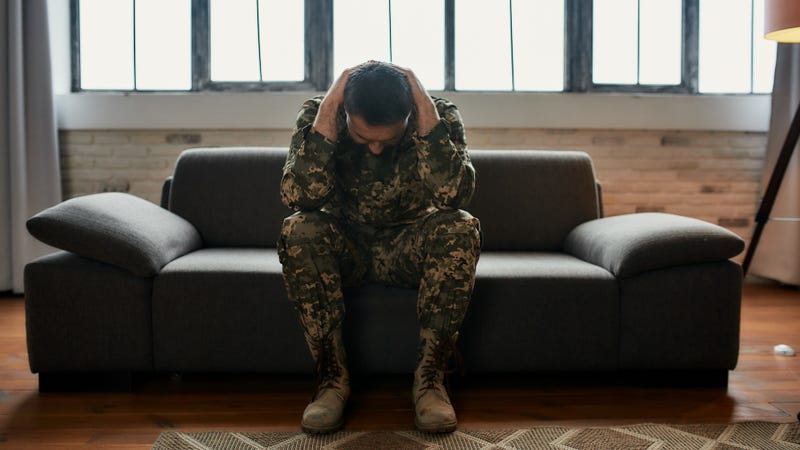
The following article and accompanying audio include discussions of mental health and suicide
Men and women of the U.S. Military are trained and equipped to fearlessly face the toughest of tasks and battles, but when it comes to one of the toughest battles of all — mental health — they need to know they aren’t alone.
LISTEN NOW: AFSP, Wounded Warrior Project highlight mental health options for Military
Audacy’s David Glover recently welcomed American Foundation for Suicide Prevention (AFSP) expert and former Air Force member, Alex Silva in addition to Wounded Warrior Project Clinical Expert, Dr. Erin Fletcher and guest, Dan Miller to discuss the importance of mental health care for Military members and share that the bravest thing many of them can do is ask for help.
“The subject of suicide in the Military is one that is still very taboo in a sense,” shared Miller, who retired after serving more than 30 years as a Marine. “The subject of post-traumatic stress disorder is still something that has a stigma to it within the Military and we’re all fighting very hard to change that — to let people know that whether you’re active duty, reservist, or you are retired or gotten out — there is help.”
Dr. Erin Fletcher of the Wounded Warrior Project detailed some of the help available by discussing the care she helps provide through Warrior Care Network, a clinical partnership between Wounded Warrior Project and four leading academic medical centers that offers accelerated care and collaborates on research to help create new, alternative care options.
“This is a very hopeful time as it comes to treatment options,” Miller expressed. “We have interventions that work, that are effective. It doesn’t need to take 25 years to feel better. We don’t have to white-knuckle our way through this... getting that message out that there’s people that want to help, and there’s help that is available and that works is incredibly important.”
While making it clear help is available, Dr. Fletcher, along with Miller and AFSP expert, Alex Silva make sure to clarify it isn’t only for Military members who entered combat. “Thoughts of suicide, anxiety, depression [don’t] discriminate based on combat,” shared Dr. Fletcher, “If you haven’t experienced combat and you have all of your limbs and all of your fingers [don’t think] you’re fine and your struggle isn’t enough — I think that’s a stigma that we absolutely want to break.”
Added Silva, “What about a drone pilot? What about somebody who doesn’t go to combat, but is still asked to do very difficult things? And then they might have the experience of, ‘Well, nobody shot me, I didn’t have to go and leave my home and my family,’ but they still have to deal with things.”
Help is available for all and Miller encourages his fellow brothers and sisters of the armed forces to reach out and grab it knowing it’s never a sign of weakness. “There is plenty of people out there that want to give you a hand. You’re not alone, There is nothing wrong with speaking out,” Miller said to conclude the discussion. “We have to help each other, we have to look out for each other. It is perfectly fine if you are struggling. To say something — you are not a weak individual.”
Hear more about resources by listening to the full podcast above and visiting The American Foundation for Suicide Prevention and Wounded Warrior Project websites. If you or someone you know is in immediate need of assistance, call 988.
Audacy's I’m Listening initiative aims to encourage those who are dealing with mental health issues to understand they are not alone. If you or anyone you know is struggling with depression or anxiety, know that someone is always there. Additionally, the Suicide & Crisis Lifeline is available 24 hours a day, 7 days a week at 988. Find a full list of additional resources here.